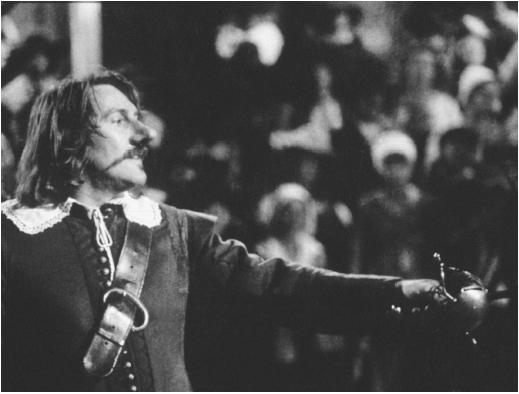Cyrano De Bergerac - Film (Movie) Plot and Review
France, 1990
Director: Jean-Paul Rappeneau
Production: Hachette Premiere et Cie/Camera One/U.G.C/D.D Productions/Films A2; colour, 35mm; running time: 138 minutes.
Producers: Michel Seydoux, Rene Cleitman; screenplay: Jean-Paul Rappeneau, Jean-Claude Carriere, from the play by Edmond Rostand; subtitles: Anthony Burgess; photography: Pierre Lhomme; editor: Noelle Boisson; assistant directors: Thierry Chabert, Francine Meunier, Nathalie Bezon, Attila Monost; art directors: Jacques Rouxel, Tamas Banovich; production design: Ezio Frigerio; music: Jean-Claude Petit; costumes; Franca Squarciapino; sound: Jean Goudier, Pierre Gamet, Dominique Hennequin.
Cast: Gérard Dépardieu ( Cyrano de Bergerac ); Anne Brochet ( Roxane ); Vincent Perez ( Christian de Neuvillette ); Jacques Weber ( Comte de Guiche ); Roland Bertin ( Ragueneau ); Phillippe Morier-Genoud ( LeBret ); Philippe Volter ( Vicomte de Valvert ); Josiane Stoleru ( Duenna ).
Awards: Best Actor, Cannes 1990.
Publications
Script:
Rappeneau, Jean-Paul, and Jean-Claude Carrière, Cyrano de Bergerac, d'après l'oeuvre d'Edmond Rostand , Paris, 1990.
Articles:
Variety (New York), 4 April 1990.
Strauss, F., Cahiers du Cinéma (Paris), April 1990.
Merrick, H., "Le Marivadange Héroique" in Revue du Cinéma (Paris), April 1990.
Amiel, V., "L'esprit du theatre et la beauté du cinéma" in Positif (Paris), May 1990.
Manceau, J.L., Cinéma (Paris), May 1990.
Logett, L., "Autour de Cyrano" in Jeune Cinéma (Paris), June-July 1990.
Buruina, M., and others, Séquences (Montreal), September 1990.
Horguelin, T., "Le film de Roxane" in 24 Images (Montreal), Autumn 1990.
" Cyrano de Bergerac ," in Reid's Film Index , no. 6, 1991.
Strick, P., Monthly Film Bulletin (London), January 1991.
West, J.M., Cineaste (New York), February 1991.
Kermol, E., in Le Costa Vista (Trieste), no. 18, 1992.

Abdullaeva, Z., in Iskusstvo Kino (Moscow), no. 11. 1992.
Douin, Jean-Luc, in Télérama (Paris), 23 March 1994.
* * *
The makers of this most recent telling of the Edmond Rostand classic have accomplished a most praiseworthy feat. They have taken a century-old romance of nobility and love's sacrifice and maintained a healthy measure of the flavor of the original, while at the same time bringing it to life for audiences of the 1990s.
In 1897, Rostand first presented this self-proclaimed "heroic comedy" about a proud Gascoyne swordsman, poet and lover with an enormous nose. Through the first half of the 20th-century, Cyrano was produced on many occasions with great success. Coquelin and Walter Hampden were but two of the actors who interpreted Cyrano. In recent years, however, the lacey prose and honeyed poetry of Rostand (known to most American audiences through the traditional English translation by Brian Hooker, written in 1923) has appealed mainly to more literary audiences. The 1950 Stanley Kramer production featuring Jose Ferrer as Cyrano had been considered the definitive film adaptation, but it has been overshadowed by this more contemporary, action-packed and in some ways more relevant production.
Director Jean-Paul Rappeneau and star Gérard Dépardieu have cut through the fine embroidery of Cyrano to the play's solid core, and emphasize Cyrano as an individualist. He is shown as a man of principle who would rather suffer the fate of an outsider than relinquish his own brand of panache. Dépardieu offers a naturalistic performance, playing Cyrano with an earthiness and virility that permeates much of the actor's film work. With an unabashed pride and stubbornness, Cyrano scoffs at two-faced politicians and attacks mannered fops who kowtow with insincere grace in exchange for courtly favors. Dépardieu's swordsmanship is no more skillful than Jose Ferrer's was, but this production is created with a greater excitement towards the sword fight sequences. Whereas Ferrer's Cyrano parries and thrusts half-hidden amid the black and grey shadows of the back streets of Paris, Dépardieu's Cyrano duels with a greater relish in more colorful surroundings and in stronger light, to the accompaniment of a more fluid camera.
A ruggedness of atmosphere properly places Cyrano in a rough-and-tumble man's world. At the cadets' headquarters, one sees soldiers in various stages of undress. There, one can smell the musk of the leather protective gear. At the battle stations, unwashed and hungry soldiers hunt down a rat and skin it for supper. As the men suffer for lack of meat, Cyrano calls upon an elderly shepherd to sing a folk song to remind them of their proud Gascoyne heritage. These moments of unaffected custom give emphasis to the difference between Cyrano's world and the refined, phony spheres in which Cyrano's enemies, the actor Montfleury and the Compte de Guiche, travel.
The film's English subtitles, written by Anthony Burgess, present a tasteful and lively text. As one might hope, the prose pays homage to the old-fashioned, flowery recitations in the Rostand play, maintaining the original flavor of the piece. Burgess uses good judgement in occasional decisions to keep to the French language. Roxane, for example, who is cousin to Cyrano and the love of his life, is referred to as "precieuse." The strength of this word and the way the lips move when it is pronounced make this the authoritative description of Cyrano's secret sweetheart. In the finale, as he dies, Cyrano's last words refer to the one laurel he will take with him to the grave: "my panache." Burgess could have translated that term as Hooker did, as "my white plume." But, for today's audiences, such a term seems insignificant. The French word "panache" holds weight.
The trio of Dépardieu, Rappeneau and Burgess have assembled a Cyrano de Bergerac that is naturalistic in style. It is at once a respectful interpretation of its original source material and an action-packed, full-bodied production designed to appeal to contemporary audiences.
—Audrey E. Kupferberg
Comment about this article, ask questions, or add new information about this topic: